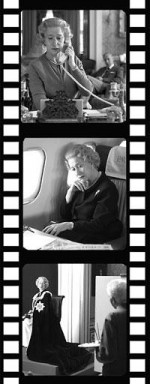A peek behind the royal curtain

Most films are content with merely entertaining audiences with a fictional tale designed to evoke some kind of emotional response. Others have a loftier ambition: to strive to provide viewers with insight into the mindset of a historical figure. To that effect, The Queen succeeds.
Chronicling the week following the shocking death of Princess Diana in 1997, The Queen stars Helen Mirren in the pivotal role of Elizabeth II. The film offers a snapshot of British politics by depicting the royal family’s response to one of its most historic moments. In doing so, it delves into the divergent sensibilities of Elizabeth and the citizens she rules.
After scooping up nearly every major award for her subdued performance as Elizabeth II, Mirren is almost certain to earn her first Academy Award for the role next month. She accurately portrays the queen’s intelligence and restrained emotion, and her quiet and reflective manner suggests a sense of lost innocence. Forced to take the throne as a young girl, Elizabeth gradually realizes that the values she holds dear are no longer in sync with those of her kingdom. The film portrays her as a remaining vestige of an era long gone, and this difference of world views truly lies at the heart of the story.
While Mirren has received endless praise for her portrayal of the film’s title character, Michael Sheen has been consistently overlooked for his strong performance as Tony Blair. Though Blair is still adjusting to his recent appointment as prime minister, Diana’s death puts him in direct conflict with Elizabeth. While Her Majesty resolutely holds to her antiquated belief that the royal family should grieve in private, the response of the devastated masses spurs Blair to embark on an attempt to “modernize” the traditionally stolid monarchy. Throughout the film, especially in his scenes with Mirren, Sheen exudes the perfect balance of frustration, admiration and intimidation, creating a multifaceted and fascinating character in the charismatic Blair.
Director Stephen Frears – who is probably best known to American audiences for the John Cusack comedy High Fidelity – keeps the film appropriately narrow in scope. His deft use of actual news footage of Diana and the public’s reaction to her death aids in the film’s re-enactment of this period of global grief, effectively conveying the extreme nature of the situation and the accompanying pressure on the queen.
However, even at 103 minutes, The Queen feels somewhat overextended. The script, written by Peter Morgan (The Last King of Scotland), wisely bookends the film with two superficially similar but contextually different meetings between Elizabeth and Blair, but the bulk of The Queen still seems prolonged, as the entire film hinges on Elizabeth’s inevitable decision to make a public appearance to acknowledge Diana’s death. While this is clearly the film’s focus, perhaps the addition of a subplot would have made the film a more streamlined experience. Nominated for six Oscars, including Best Motion Picture of the Year, The Queen remains focused on the British monarch’s response to Diana’s death, and consequently, it provides some depth to the mysterious monarch. Although the film is sometimes on the slow side, it does give audiences a glimpse into the royal response to Diana’s death and is a well-crafted depiction of a courageous departure from tradition by a woman whose sense of duty must adapt to the needs of her people.
Grade: B
Rated: PG-13Running time:?103 mins.






